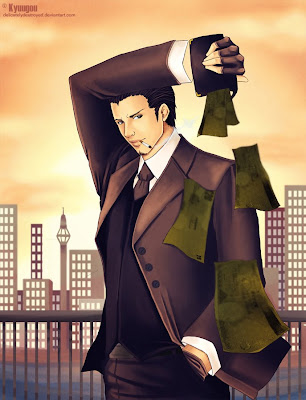 Chapter one Pride And Prejudice : Views on marriage
Chapter one Pride And Prejudice : Views on marriageThe first view on marriage is summed up within the first sentence of the novel, "It is a truth universally acknowledged, that a man in possesion of a good fortune, must be in want of a wife." The rest of the chapter shows the opposite view to the one stated at the start. It is instead, "A truth universally acknowledged, that a woman in want of a good fortune, must be in want of a husband". This is proven when Mrs.Bennet takes it as her job to get one of her daughters married off to a wealthy man who comes, while Mr.Bennet does not care as much. Other mothers and women behave in this way aswell, they consider the wealthy man, "as the rightful property of someone or other of thier daughters."
Mrs.Bennet portrays the mother of her time period, and replicates the opinions of the time. Women usually married men thier parents chose for them, it is now up to Mrs.Bennet to chosse a husband for one of her daughters. This is the reason why she is excited about the wealthy young man. When Mr.Bennet asks if the young man is single or married, Mrs.Bennet immediately replys, "Oh! Single, my dear to be sure." Although it is her job to marry off her daughters, she is very picky about what kind of man they are to be married to. The most important thing is how wealthy the man is, "A single man of large fortune; four or five thousand a year. What a fine thing for our girls." But no matter how mard she tries to marry off one of her daughters, the final decision appears to be done by the man of the house. Which is why she insists that Mr.Beent, "must visit him as soon as he comes" so that he "may fall in love" with one of her daughters. Her family is to be married off to money.
Women could not inhereht money and could only get small work positions, which is why they had to be married off to a man who could take care of them and was of thier status. Therefore Mrs.Bennets views are altered to Mr.Bennets views. His interes in having his daughters married off is not as drastic as Mrs. Bennets opinion. He is still wants his daughters to be married off, which is why he asked if the young man was married or single. He pays more attention to whom in specific the man will marry , "I will send a few lines by you to assure him hearty of my consent to his marrying which ever he cuses of the girls:though I must throw in a good word for my little Lizzie...Lizzie has some thing more of quickness." He dislikes the fact that he always has to visit young rich men, but he does it because he cares about his daughters. Especially Elizabeth. He wants his daughters to marry well, but he wants them to marry because they wanted to, because of love.
Both marriage for love and money are expressed in the views of characters in chapter one. Parents are involved in the marriage of thier daughters so that they may improve thier family image. Mothers saw it as the buisness of thier life to get their daughters married. Fathers visited theses young men to talk with and throw in a good word for thier daughters. Everything they did when a wealthy young man came to visit, was to see if they could get him to marry thier daughter. The views of the young man are not stated in the first chapter, but the views of the surrounding families are obvious as sthey all try to make him fall in love and marry.
Hey, Annamaria! Your blogs have been really amazing. The previous blog, where you wrote in the point of view of the character was a great idea, and very interesting. This blog also was helpful, it was a great background piece, that helped to put the characters' views and society into perspective.
ReplyDeleteAnnamaria... first before i comment due to Mr. Tangen's request, i must tell you that i never see you anywhere anymore!! i miss our spanish literacy class!! but anyways... this blog was very interesting and very factual according to the book. i took a different approach to my first blog but i may revert to this topic on my next one. This helped with the reasoning as to why things were done as they were in the novel.
ReplyDeleteMoney does seem to be the primary quality the parents look for in the husband for their daughter's. You pointed out that "Women could not inhereht money and could only get small work positions." I wonder if Mrs. Bennet is more concerned about money than Mr. Bennet because she knows how her daughters will end up if they do not marry a husband with money. Mr. Bennet was never faced with this fear, so maybe that allows him to "[want] them to marry because they wanted to, because of love." More likely is that he is just nicer than the annoying Mrs. Bennet.
ReplyDeleteI disagree with the way you analyze Mrs. Bennett. You say: "Mrs.Bennet portrays the mother of her time period, and replicates the opinions of the time," but I believe there's not enough proof in the text to make that conclusion.
ReplyDeleteI also think that the characters' personalities play a vital role in the context of the story. Mr. Bennett is described as a reserved man, while his wife is portrayed as an "uncertain tempered woman, eager to find her daughters a husband". I believe the way Mr. and Mrs. Bennett's react towards marriage is mainly due to their temper.